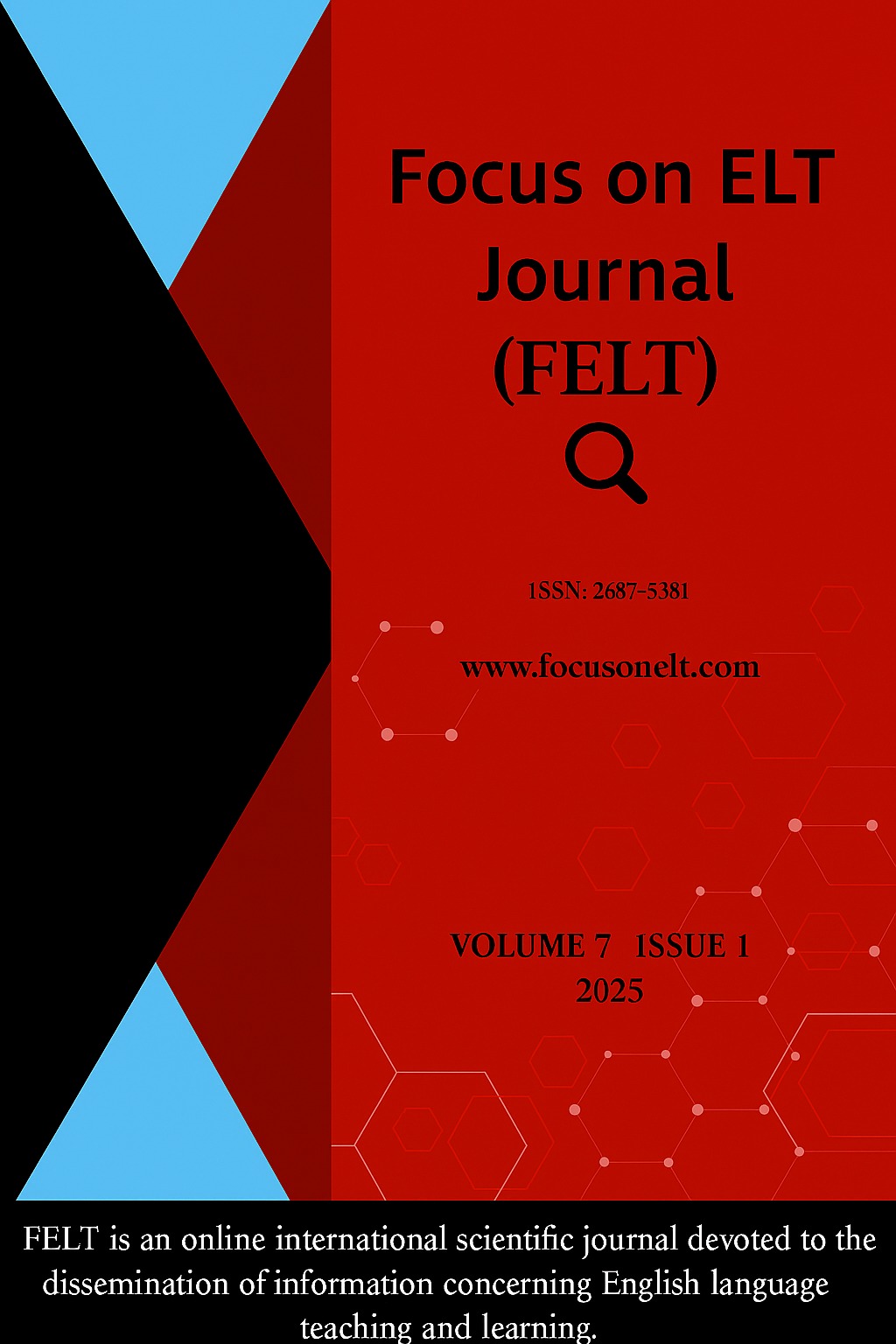Investigating Turkish EFL teachers’ mindsets regarding their teaching competence
Main Article Content
Abstract
The mindset of English as a Foreign Language (EFL) teachers plays a significant role in fostering an effective and progressive language teaching process. This study incorporates mindset theory within the context of secondary school EFL education, in Türkiye, aiming to investigate EFL teachers' mindset beliefs regarding their teaching competences and explore the rationale behind their beliefs. To achieve this, an exploratory qualitative research approach was employed, with a purposive sampling method to select 20 in-service Turkish EFL teachers. Data were collected using two semi-structured interviews and a Q-Sorting Activity. Interview 1, conducted before the Q-Sorting Activity, uncovered the teachers’ professional profiles and beliefs about their own teaching, thus tailoring Interview 2. The Q-Sorting Activity, in which participants ranked 13 statements about teaching competence on a distribution grid ranging from 'cannot be changed' to 'highly changeable', explored teachers’ mindset beliefs about their teaching competence. The statements were scored numerically, from 1 to 6, and analyzed for patterns to uncover teachers’ shared viewpoints. Interview 2 was then conducted immediately to deepen insights and better understand the reasoning behind the selections made during the Q-Sorting task. The findings demonstrate that EFL teachers’ mindsets are predominantly growth-oriented, attributing their beliefs to factors such as teaching experience, effort, and professional development. Simultaneously, they also identified barriers to improvement, including overcrowded classrooms and students' fixed-mindset beliefs. This study underscores the importance of expanding research on the psychology of language teaching.
Metrics
Article Details

This work is licensed under a Creative Commons Attribution-NonCommercial-NoDerivatives 4.0 International License.
References
Carr, P. B., & Dweck, C. S. (2011). Intelligence and motivation. In R. J. Sternberg & S. B. Kaufman (Eds.), The Cambridge handbook of intelligence (pp. 748-770). Cambridge University Press.
https://doi.org/10.1017/CBO9780511977244.038
Coogan, J., & Herrington, N. (2011). Q methodology: An overview. Research in Secondary Teacher Education, 1(2), 24-28. https://doi.org/10.15123/uel.8604v
Cimpian, A., Arce, H. M. C., Markman, E. M., & Dweck, C. S. (2007). Subtle linguistic cues affect children's motivation. Psychological Science, 18(4), 314-316. https://doi.org/10.1111/j.1467-9280.2007.01896.x
Ergen, S. (2019). Exploring the relationship between teachers’ mindset and their technology self-efficacy among the secondary school EFL teachers (Master’s thesis, Başkent University, Institute of Educational Sciences).
DeLuca, C., Coombs, A., & LaPointe-McEwan, D. (2019). Assessment mindset: Exploring the relationship between teacher mindset and approaches to classroom assessment. Studies in Educational Evaluation, 61, 159-169. https://doi.org/10.1016/j.stueduc.2019.03.012
Dweck, C. S. (2006). Mindset: The new psychology of success. Random House.
Dweck, C. S. (2014). Teachers’ mindsets: “Every student has something to teach me.” Feeling overwhelmed? Where did your natural teaching talent go? Try pairing a growth mindset with reasonable goals, patience, and reflection instead. It’s time to get gritty and be a better teacher. Educational Horizons, 93(2), 10–15. https://doi.org/10.1177/0013175X14561420
Dweck, C. S. (2016). What having a “growth mindset” actually means. Harvard Business Review, 13, 213-226.
Dweck, C. S. (2017). From needs to goals and representations: Foundations for a unified theory of motivation, personality, and development. Psychological Review, 124, 689–719. https://doi.org/10.1037/rev0000082
Dweck, C. S., & Yeager, D. S. (2019). Mindsets: A view from two eras. Perspectives on Psychological Science, 14(3), 481-496. https://doi.org/10.1177/1745691618804166
European Commission. (2013). Supporting teacher competence development for better learning outcomes.
Goldstein, S., Brooks, R., & DeVries, M. (2012). Translating resilience theory for application with children and adolescents by parents, teachers, and mental health professionals. In Resilience in children, adolescents, and adults: Translating research into practice (pp. 73–90). Springer New York.
https://doi.org/10.1007/978-1-4614-4939-3_6
Hattie, J. (2012). Visible learning for teachers: Maximizing impact on learning. Routledge.
https://doi.org/10.4324/9780203181522
Haukås, Å., & Mercer, S. (2022). Exploring pre-service language teachers’ mindsets using a sorting activity. Innovation in Language Learning and Teaching, 16(3), 221-233.
https://doi.org/10.1080/17501229.2021.1923721
Irie, K., Ryan, S., & Mercer, S. (2018). Using Q methodology to investigate pre-service EFL teachers’ mindsets about teaching competences. Studies in Second Language Learning and Teaching, 8(3), 575-598. https://doi.org/10.14746/ssllt.2018.8.3.3
King, R. B. (2016). A fixed mindset leads to negative affect. Zeitschrift Für Psychologie, 225(2), 137–145. https://doi.org/10.1027/2151-2604/a000290
Liu, L., Fathi, J., Allahveysi, S. P., & Kamran, K. (2023). A model of teachers’ growth mindset, teaching enjoyment, work engagement, and teacher grit among EFL teachers. Frontiers in Psychology, 14, 1137357. https://doi.org/10.3389/fpsyg.2023.1137357
Lou, N. M., & Noels, K. A. (2016). Changing language mindsets: Implications for goal orientations and responses to failure in and outside the second language classroom. Contemporary Educational Psychology, 46, 22-33. https://doi.org/10.1016/j.cedpsych.2016.03.004
Lou, N. M., & Noels, K. A. (2017). Measuring language mindsets and modelling their relations with goal orientations and emotional and behavioural responses in failure situations. The Modern Language Journal, 101(1), 214-243. https://doi.org/10.1111/modl.12380
Lou, N. M., & Noels, K. A. (2019). Promoting growth in foreign and second language education: A research agenda for mindsets in language learning and teaching. System, 86, 102126.
https://doi.org/10.1016/j.system.2019.102126
Marais, P. (2016). " We can't believe what we see": Overcrowded classrooms through the eyes of student teachers. South African Journal of Education, 36(2), 1-10. https://doi.org/10.15700/saje.v36n2a1201
Mercer, S., & Ryan, S. (2010). A mindset for EFL: Learners’ beliefs about the role of natural talent. ELT Journal, 64(4), 436-444. https://doi.org/10.1093/elt/ccp083
Oldaç, B., & Aydın, S. (2023). Teachers' mindsets in foreign language classrooms. The Literacy Trek, 9(1), 1-29. https://doi.org/10.47216/literacytrek.1231866
Ryan, S., & Mercer, S. (2011). Natural talent, natural acquisition and abroad: Learner attributions of agency in language learning. In G. Murray, X. Gao, & T. Lamb (Eds.), Identity, motivation and autonomy in language learning (pp. 160–176). Multilingual Matters. https://doi.org/10.21832/9781847693747-012
Ryan, S., & Mercer, S. (2012). Implicit theories: Language learning mindsets. In Psychology for Language Learning: Insights from Research, Theory, and Practice (pp. 74-89). Palgrave Macmillan UK.
https://doi.org/10.1057/9781137032829_6
Sıvacı, S. (2023). Investigating pre-service EFL teachers' language mindset and epistemological beliefs. RumeliDE Dil ve Edebiyat Araştırmaları Dergisi, (Ö13), 1347–1356. https://doi.org/10.29000/rumelide.1379361
Yılmaz, A. (2020). The relationship between in-service teachers’ mindset types and their efficacy beliefs in instructional strategies. İzü Eğitim Dergisi, 2(4), 191-203. https://doi.org/10.46423/izujed.752446

